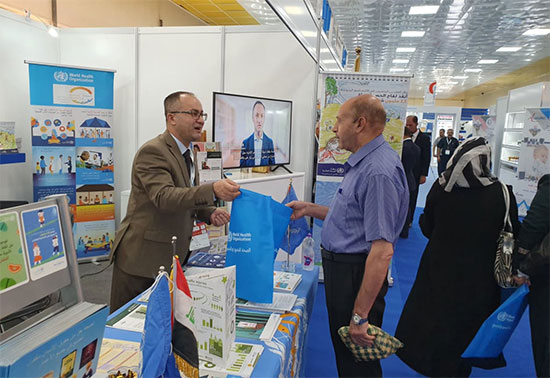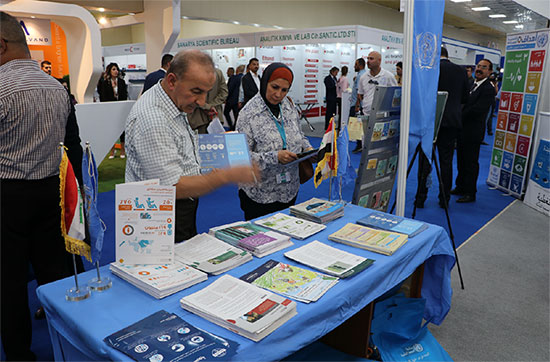 Baghdad, 16 September 2019 – More than 6000 people benefited from health education and awareness messages and information disseminated by the WHO country office during a 3-day Iraq Health Expo held in Baghdad from 2 September to 4 September 2019.
Baghdad, 16 September 2019 – More than 6000 people benefited from health education and awareness messages and information disseminated by the WHO country office during a 3-day Iraq Health Expo held in Baghdad from 2 September to 4 September 2019.
The event, which was organized by the Iraqi Ministry of Health, is the biggest health care event in the country, bringing together health care professionals, national and international agencies, service providers and investors in the health sector industry for the purpose of sharing and disseminating information and educating the public on priority public health issues.
During the event, WHO experts participated in round table discussions, media interviews and responded to questions from the public on the identified areas, and disseminated health education and promotional messages. This year’s Expo, which had a theme of “Together for better health and environment”, focused on 7 priority public health issues, including immunization, antimicrobial resistance, HIV/AIDS, environmental health, mass gatherings, road traffic and injury, family planning and thalassemia.
The event also offered WHO an opportunity to display its work, enhance its visibility and engage with health professional, academicians, students, the private sector and communities living in and around Baghdad to ensure that people enjoy better health and well-being in line with the triple billion goals.
 A 2-day conference was also held with support and participation of WHO experts during which the Ministry of Health’s vision and plans to address the above priorities and explore areas to strengthen public-private partnership, inter-agency and intersectoral collaboration were presented. Among the key recommendations agreed to during the conference are enhancing public awareness creation on priority public health issues through community engagement and partnerships with all stakeholders, expediting legislation on Health Insurance Law to achieve fairness in access to medical service, and promoting private sector involvement in health through the transition from medical evacuation to recruitment and provision of health services. Others recommendations included encouraging the use of mobile clinics as a way to fill gaps in health services and investment, as well as reducing pollution through increased reliance on “environment-friendly” methods such as the use of solar for electricity instead of gas and/or fuel.
A 2-day conference was also held with support and participation of WHO experts during which the Ministry of Health’s vision and plans to address the above priorities and explore areas to strengthen public-private partnership, inter-agency and intersectoral collaboration were presented. Among the key recommendations agreed to during the conference are enhancing public awareness creation on priority public health issues through community engagement and partnerships with all stakeholders, expediting legislation on Health Insurance Law to achieve fairness in access to medical service, and promoting private sector involvement in health through the transition from medical evacuation to recruitment and provision of health services. Others recommendations included encouraging the use of mobile clinics as a way to fill gaps in health services and investment, as well as reducing pollution through increased reliance on “environment-friendly” methods such as the use of solar for electricity instead of gas and/or fuel.
The WHO country office and Regional Office will continue working alongside the Ministry of Health to raise awareness, engage communities through health education and appropriate media channels, and disseminate key messages on all public health issues to all Iraqi citizens.




